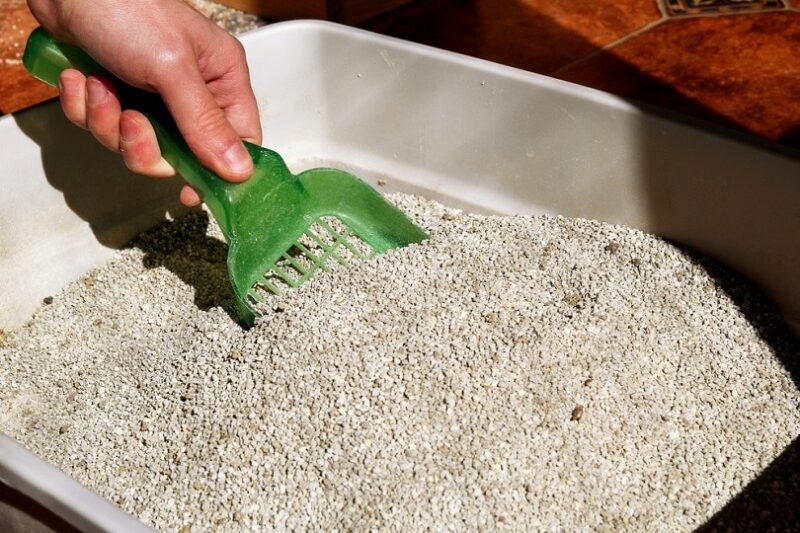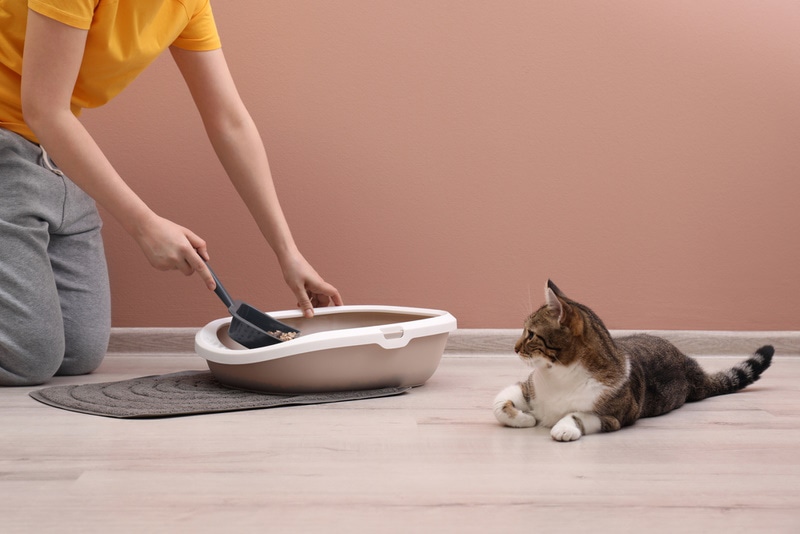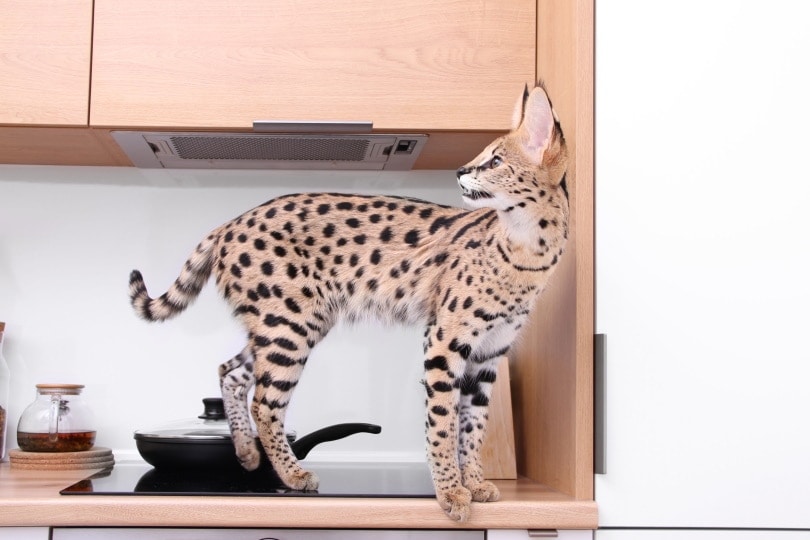How Often Should I Clean My Cat’s Litter Box? Vet-Verified Recommendations & Tips
Updated on

Click to Skip Ahead
Cleaning your cat’s litter box is essential for your cat’s health, on top of making your home clean and odor-free. However, there is not a one-size-fits-all answer to this question. There are several different factors to consider, such as the type of litter and number of cats you have. But, preferably, you should scoop out your litter box daily.
Read on below for all the details.
How Often Should I Clean My Cat’s Litter Box?
Preferably, you should scoop out your litter box daily. Sometimes, you may even need to bump this up to twice a day, depending on how many cats you have. When you scoop, remove all of the urine and feces. This helps keep the litter box clean and reduces odor.
You should also replace the litter fairly often. You don’t want to leave dirty litter in the litter box for too long. Typically, you should do this every week to every month. Clumping litter tends to require less frequent changes, as you can scoop out the urine efficiently. Even with regular litter scooping and partial litter replacement, you may need to completely change the litter box every few months. The odor will stick to the actual litter box, which can make the litter box smell stinky.
If you have multiple cats sharing the same litter box, you will need to scoop more frequently. It’s recommended to have at least one litter box per cat. Some cats do not like to use the litter box after another cat has. Therefore, they may each need their own litter box. If they regularly use the same litter box, though, you may need to halve the time between scoping and cleanings.

You will need to pay attention to your cat’s preferences and habits. Some cats may be more particular than others and require more frequent changes. If your cat starts to avoid the litter box, it may be a sign that you need to clean it more frequently. Higher-quality litter also tends to control smells better, so you may need to scoop it less often. Many people may think they are saving money by choosing a cheaper litter. However, you may need to change it more often, costing you money in the long run.
Automatic litter boxes can make the cleaning process more convenient by scooping waste for you. However, you will still need to monitor and maintain them regularly. And some cats don’t like them, and will not use them.
How Often Should You Change All the Litter in a Cat Box?
Typically, we recommend changing all the cat’s litter every week to every month. It depends largely on the type of litter you have, as they work a bit differently.
Clumping cat litter forms solid clumps when it comes into contact with urine, making it easier to scoop out waste. With clumping litter, you typically only need to change all the litter in the box once a month or as needed. However, you should scoop out waste daily and add fresh litter to maintain cleanliness and control odors.
Non-clumping litter absorbs moisture but does not form clumps. You may need to change all the litter in the box more frequently, about every 1–2 weeks, as it can become saturated with urine and may become less effective at controlling odors. You can’t just scoop out the urine, so you’ll need to change all of the litter.
If you have many cats sharing the same litter box, you’ll need to change it even more often. Not only will they dirty up the litter box twice as fast, but they may also not like the smell of the other cat.
If you notice that the litter box is starting to smell, it may be a sign that you need to change the litter. It is also possible that you need a brand-new box, as the box lining will also start to smell like litter. If you have changed the litter and the box still stinks, you may need a whole new box.
Wondering whether an enzymatic spray or deodorizing powder is better at fighting pet odors? Compare our Pet Stain & Odor Eliminator Spray to our Deodorizer Powder to see which product is best for your deodorizing needs.
Hepper Bio-Enzyme Pet Stain & Odor Eliminator Spray
Hepper Advanced Bio-enzyme Deodorizer & Litter Additive
Eliminates smells
Works inside your cat's litter
Removes stains
Works on contact
Works on a variety of surfaces
Unscented
How Often Should You Remove Poop from Cat Litter?
Preferably as much as possible. If you notice that the litter box needs to be scooped out, it is likely time to do so. However, more realistically, you should scoop it at least daily to remove all the solids (what exactly that means depends on the exact litter you’re using). Daily scooping helps keep the litter box clean and prevents odors from building up. It also ensures that your cat has a clean place to do its business. Cats may not use the litter box if it isn’t clean, so this can prevent accidents.
If your cats are sharing a litter box, you may need to do it twice a day. Typically, once in the morning and once at night works well. You may even need to do it more often if you have several cats. (However, at that point, it is best to have several litter boxes.)
Pay attention to any changes in odor. If you start to notice a strong or unpleasant odor coming from the litter box, you probably need to change it more often. Too much or too little odor may also indicate an underlying health problem. Use this regular scooping to monitor your cat’s health as well as keep the litter box clean. Changes in your cat’s litter box habits can be a sign of a health issue.

What Happens If You Don’t Clean Your Cat’s Litter Box?
If you do not scoop your cat’s litter box for a day or so, your cat will be fine. However, there are several potential issues that may pop up.
| Odor Buildup: |
The most noticeable issue to occur right away is an unpleasant odor from the litter box. Accumulated urine and feces can create a strong and persistent smell that permeates your home.
|
| Unsanitary Conditions: |
A dirty litter box is unsanitary and unhealthy for your feline. Bacteria can multiply, leading to infections and other health issues.
|
| Behavior Problems: |
Cats are typically clean animals, and they may start avoiding a dirty litter box. If the box becomes too soiled, your cat may choose to eliminate elsewhere in your home, leading to litter box avoidance or inappropriate urination and defecation.
|
| Litter Clumping: |
When over-soiled, clumping cat litter will stop clumping properly. It will be less effective at containing waste and odors.
|
| Increased Work: |
Neglecting regular cleaning may make it more challenging to clean the litter box when you eventually get around to it, as waste can become stuck to the box itself or create stubborn clumps. Plus, your cat may decide to defecate elsewhere, making it harder to clean up.
|
Conclusion
You need to scoop your litter box about every day—or more if you have several cats. Some cat litter may need to be scooped out twice a day, and some cats may be so picky that they demand it to be scooped out every day. However, generally, once a day is enough.
Then, you should completely change the litter every week to every month. Clumping cat litter needs to be changed less often, while non-clumping cat litter may need to be changed more often. You may also need to get a completely new box every few months to a year. They can “absorb” the smell over time, making your cat’s litter box stinky even when it’s technically clean.
Featured Image Credit: Zoran Photographer, Shutterstock
















